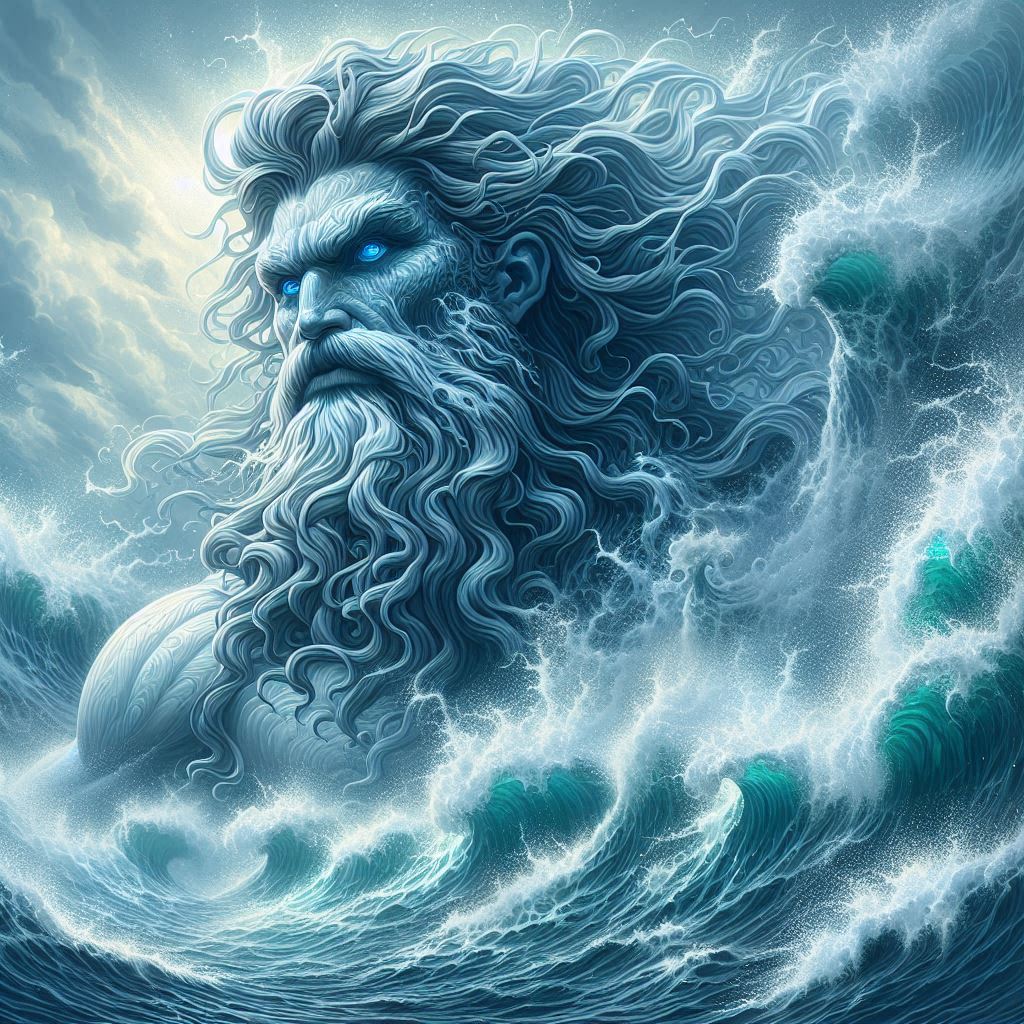Oceanus: The Primordial Titan of the Endless Waters
Table of Contents
- Who is Oceanus?
- Powers of Oceanus
- Oceanus and the Titanomachy
- The Role of Tethys
- Oceanus: The Endless Boundary
- Facts From Greek Mythology
- Conclusion
Who is Oceanus?
Oceanus was one of the twelve original Titans, the children of Uranus (the Sky) and Gaia (the Earth). As the embodiment of the great river or ocean that encircled the Earth, Oceanus represented the outermost boundary of the ancient Greeks' understanding of geography and the cosmos. In the Greek view of the world, before human exploration and the age of science, the known lands were thought to be surrounded by an immense river that flowed endlessly—this was the realm of Oceanus.
Oceanus was married to Tethys, another Titaness, and together they were the parents of the Potamoi (river gods) and the Oceanids (nymphs of springs, streams, and fountains). Their offspring governed every body of water on Earth, from the grandest rivers to the smallest brooks, creating a vast family of water deities that influenced life, agriculture, and the natural world.
Powers of Oceanus
As the Titan of the vast, encircling waters, Oceanus wielded several important powers that shaped the natural and cosmic world:
- Control over Water Systems: Oceanus was believed to control all bodies of water surrounding the Earth, from rivers to oceans. While Poseidon ruled the seas, Oceanus presided over the primal, endless river that bordered the known world.
- Influence over the Cycles of Nature: As the great river god, Oceanus’ waters fed into rivers and streams, sustaining life on Earth. He was linked to the flow of time and the cycles of nature, much like a constant, renewing force.
- Boundary Guardian: Oceanus’ domain served as the boundary between the known world and the mysterious outer realms. He symbolized the limit of knowledge, the edge of the Earth, and even the boundary between life and death in some myths.
- Father of River Gods and Nymphs: Oceanus’ vast progeny included river gods (Potamoi) and water nymphs (Oceanids), who carried out his influence across the Earth. These deities were responsible for nourishing lands and providing water to civilizations.
Oceanus and the Titanomachy
While many of his Titan siblings rebelled against the Olympian gods in the famous Titanomachy—the great war between the Titans and Olympians—Oceanus remained neutral. He neither supported Cronus, the leader of the Titans, nor sided with Zeus and the Olympians. This neutrality allowed Oceanus to maintain his power and avoid imprisonment in Tartarus, the deep abyss where many Titans were confined after their defeat.
His decision to stay out of the conflict symbolizes his role as a peaceful, steady force—unlike the violent, chaotic elements that dominated much of Greek mythology. While the Titans and gods battled for control of the cosmos, Oceanus continued to flow serenely around the Earth, a symbol of continuity and stability amidst turmoil.
The Role of Tethys
Tethys, the wife and sister of Oceanus, played a crucial role in Greek mythology as the mother of the great rivers and water nymphs. She was known as the nurturing, life-giving force of freshwater. While Oceanus governed the vast outer sea, Tethys was responsible for the rivers, springs, and fountains that sustained life on Earth.
Together, Oceanus and Tethys formed a divine couple that controlled the Earth's water systems, ensuring the balance of nature. Tethys herself was often invoked in myths regarding fertility and the flow of freshwater to nourish crops and sustain civilizations. Their harmonious relationship underscores the cooperative power of nature, where the boundaries of the ocean met the life-giving rivers.
Despite their significant roles, neither Oceanus nor Tethys was heavily involved in the cosmic battles of the gods. Their children, however, such as the Oceanids and Potamoi, influenced various mythological tales, intertwining with heroes, gods, and other natural forces.
Oceanus: The Endless Boundary
What makes Oceanus particularly interesting is the concept he embodies: the boundary between the known world and the unknown. For the ancient Greeks, who had limited knowledge of the world's geography, Oceanus was a natural border between civilization and the mysterious realms beyond. He represented the edge of the Earth, where the sun would rise and set, and beyond which lay the domains of gods, monsters, and the afterlife.
In some myths, Oceanus was thought to mark the border between the world of the living and the dead. Heroes like Heracles and Odysseus ventured near Oceanus’ waters on their quests, approaching the lands beyond human comprehension. In this sense, Oceanus symbolizes not just the physical boundary of the Earth but the metaphysical border between life and death, order and chaos.
Facts From Greek Mythology
Here are some interesting facts about Oceanus from Greek mythology:
- Oceanus was not a sea god: Unlike Poseidon, Oceanus governed the river that encircled the Earth, not the seas and oceans. He represented the primal waters that existed before the Olympian gods took control.
- Oceanus and Tethys had a vast progeny: They were the parents of 3,000 river gods and 3,000 Oceanid nymphs, each responsible for different rivers, streams, and springs around the Earth.
- Neutral in the war of gods: Unlike many Titans, Oceanus chose to remain neutral during the Titanomachy, which is why he wasn’t banished to Tartarus like many of his siblings.
- Oceanus in the afterlife: Some myths place Oceanus as a boundary between the world of the living and the dead, with the souls of the dead crossing his waters to reach the Underworld.
Conclusion
Oceanus, the Titan of the world's encircling waters, is a figure of profound depth and meaning. He may not have wielded thunderbolts or carried the Earth on his shoulders, but his quiet, persistent presence in Greek mythology speaks to the timeless power of water and the mysteries of the natural world. As the embodiment of the world's outer boundary, Oceanus invites us to contemplate what lies beyond—both in the physical realm and in the deeper currents of life itself.
His relationship with Tethys highlights the balance between the great seas and the life-giving rivers, both critical to the survival of ancient Greek civilization. Together, they symbolize the nurturing power of nature and its endless cycles.
In a world where new discoveries are constantly being made, Oceanus stands as a symbol of the eternal journey to understand the unknown, reminding us that, much like the waters he governed, knowledge is a flowing, ever-expanding frontier.


